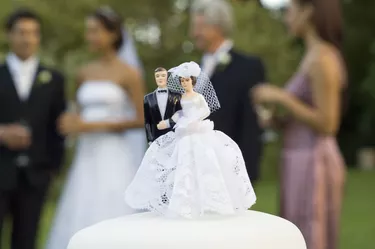
Who pays for that? That can be the big question, or even the big argument, between couples when sorting out wedding expenses. Traditionally, the largest expenses -- planning the wedding ceremony, the bride's dress, flowers, transportation, photography and the reception -- are paid for by the bride and her family. Although formal wedding traditions are becoming less the norm when it comes to financing couples' big day, some brides and grooms still opt to follow time-tested customs. In the spirit of tradition, the family of the groom has a financial obligation as well, albeit a much-less expensive one.
Rehearsal Dinner and Lodging
Video of the Day
Traditionally, the rehearsal dinner is the only wedding-related event for which a groom's parents are expected to pay. The rehearsal dinner is held the evening before the wedding, typically after the rehearsal, and can range from an informal event such as a backyard barbecue to dinner at an upscale restaurant or hotel. All parents, grandparents and siblings of the wedding party should be invited. If you have guests from out of town, it is common to invite them as well. The groom's mother is traditionally the host of the event and should send out invitations in advance. The budget for the event can vary widely based on location and number of people expected to attend.
Video of the Day
Corsages and Boutonnieres
The groom or his family also buys corsages and boutonnieres for immediate family members of both the bride and groom. Flowers should match the colors and theme of the wedding and be given to parents, grandparents and siblings. The groom's party should also buy gifts and boutonnieres for each of the groomsmen. Pin-on or wrist corsages are acceptable. Fresh flower corsages and boutonnieres range in price from $10 to $50 as of the time of publication.
Marriage License and Officiating
The groom is also expected to pay for the marriage license and fees charged by the wedding officiant. His family may opt to pay these expenses as well. A marriage license must be obtained in the state where the marriage is to take place. The bride and groom must file an application to the state and pay the appropriate fees, typically less than $100, but they vary by locality. Note that some states require a waiting period to obtain a license, and licenses can expire. Officiant's fees vary based on the type of person officiating the ceremony and should be discussed in advance.
Gifts for the Bride
Finally, the groom traditionally buys specific gifts for the bride on or around the wedding day. He should buy the bride's bouquet (sometimes his family may pay for this). The groom should also purchase a wedding band for the bride and finance a honeymoon for the couple. Traditionally, the groom also purchases a gift for his bride on their wedding day, but this expense should be his alone.